- Home
- Lauren Kate
The Fallen Sequence: An Omnibus Edition
The Fallen Sequence: An Omnibus Edition Read online
Contents
Cover
Title Page
Fallen
Torment
Passion
About the Author
Copyright
This is a work of fiction. Names, characters, places, and incidents either are the product of the author’s imagination or are used fictitiously. Any resemblance to actual persons, living or dead, events, or locales is entirely coincidental.
Copyright © 2009 by Tinderbox Books, LLC and Lauren Kate
All rights reserved. Published in the United States by Delacorte Press, an imprint of Random House Children’s Books, a division of Random House, Inc., New York.
Delacorte Press is a registered trademark and the colophon is a trademark of Random House, Inc.
WWW.RANDOMHOUSE.COM/TEENS
WWW.FALLENBOOKS.COM
Library of Congress Cataloging-in-Publication Data is available upon request.
eISBN: 978-0-375-89675-0
Random House Children’s Books supports the First Amendment and celebrates the right to read.
v3.0
FOR MY FAMILY,
WITH GRATITUDE AND LOVE
ACKNOWLEDGMENTS
Enormous thanks to everyone at Random House and Delacorte Press for doing so much so quickly and so well. To Wendy Loggia, whose easy generosity and enthusiasm have spurred me on from the beginning. To Krista Vitola, for a hugely helpful behind-the-scenes job. To Brenda Schildgen at UC Davis, for the background and inspiration. To Nadia Cornier, for helping get this whole thing off the ground. To Ted Malawer, for his sharp, graceful, and funny editorial guidance. To Michael Stearns, former boss-man, now trusted colleague and friend. You are, simply, a genius.
To my parents; my grandparents; Robby, Kim, and Jordan; and my new family in Arkansas. Words fail when I think of your unwavering support. I love you all.
And to Jason, who talks to me about characters as if they are real people until I can figure them out. You inspire me, you challenge me, you make me laugh every day. You have my heart.
Contents
Cover
Title Page
Copyright
Dedication
Acknowledgments
Epigraph
In The Beginning
Chapter One - Perfect Strangers
Chapter Two - Fit to Be Tied
Chapter Three - Drawing Dark
Chapter Four - Graveyard Shift
Chapter Five - The Inner Circle
Chapter Six - No Salvation
Chapter Seven - Shedding Light
Chapter Eight - A Dive too Deep
Chapter Nine - State of Innocence
Chapter Ten - Where There’s Smoke
Chapter Eleven - Rude Awakening
Chapter Twelve - Into Dust
Chapter Thirteen - Touched At The Roots
Chapter Fourteen - Idle Hands
Chapter Fifteen - The Lions’ Den
Chapter Sixteen - Hanging in the Balance
Chapter Seventeen - An Open Book
Chapter Eighteen - The Buried War
Chapter Nineteen - Out of Sight
Chapter Twenty - Daybreak
Epilogue - Two Great Lights
But paradise is locked and bolted…
We must make a journey around the world
to see if a back door has perhaps been left open.
—HEINRICH VON KLEIST, “On the Puppet Theater”
IN THE BEGINNING
HELSTON, ENGLAND
SEPTEMBER 1854
Around midnight, her eyes at last took shape. The look in them was feline, half determined and half tentative—all trouble. Yes, they were just right, those eyes. Rising up to her fine, elegant brow, inches from the dark cascade of her hair.
He held the paper at arm’s length to assess his progress. It was hard, working without her in front of him, but then, he never could sketch in her presence. Since he had arrived from London—no, since he had first seen her—he’d had to be careful always to keep her at a distance.
Every day now she approached him, and every day was more difficult than the one before. It was why he was leaving in the morning—for India, for the Americas, he didn’t know or care. Wherever he ended up, it would be easier than being here.
He leaned over the drawing again, sighing as he used his thumb to perfect the smudged charcoal pout of her full bottom lip. This lifeless paper, cruel imposter, was the only way to take her with him.
Then, straightening up in the leather library chair, he felt it. That brush of warmth on the back of his neck.
Her.
Her mere proximity gave him the most peculiar sensation, like the kind of heat sent out when a log shatters to ash in a fire. He knew without turning around: She was there. He covered her likeness on the bound papers in his lap, but he could not escape her.
His eyes fell on the ivory-upholstered settee across the parlor, where only hours earlier she’d turned up unexpectedly, later than the rest of her party, in a rose silk gown, to applaud the eldest daughter of their host after a fine turn at the harpsichord. He glanced across the room, out the window to the veranda, where the day before she’d crept up on him, a fistful of wild white peonies in her hand. She still thought the pull she felt toward him was innocent, that their frequent rendezvous in the gazebo were merely … happy coincidences. To be so naïve! He would never tell her otherwise—the secret was his to bear.
He stood and turned, the sketches left behind on the leather chair. And there she was, pressed against the ruby velvet curtain in her plain white dressing gown. Her black hair had fallen from its braid. The look on her face was the same as the one he’d sketched so many times. There was the fire, rising in her cheeks. Was she angry? Embarrassed? He longed to know, but could not allow himself to ask.
“What are you doing here?” He could hear the snarl in his voice, and regretted its sharpness, knowing she would never understand.
“I—I couldn’t sleep,” she stammered, moving toward the fire and his chair. “I saw the light in your room and then”—she paused, looking down at her hands—“your trunk outside the door. Are you going somewhere?”
“I was going to tell you—” He broke off. He shouldn’t lie. He had never intended to let her know his plans. Telling her would only make things worse. Already, he had let things go too far, hoping this time would be different.
She drew nearer, and her eyes fell on his sketchbook. “You were drawing me?”
Her startled tone reminded him how great the gap was in their understanding. Even after all the time they’d spent together these past few weeks, she had not yet begun to glimpse the truth that lay behind their attraction.
This was good—or at least, it was for the better. For the past several days, since he’d made the choice to leave, he’d been struggling to pull away from her. The effort took so much out of him that, as soon as he was alone, he had to give in to his pent-up desire to draw her. He had filled up his book with pages of her arched neck, her marble collarbone, the black abyss of her hair.
Now, he looked back at the sketch, not ashamed at being caught drawing her, but worse. A cold chill spread through him as he realized that her discovery—the exposure of his feelings—would destroy her. He should have been more careful. It always began like this.
“Warm milk with a spoonful of treacle,” he murmured, his back still to her. Then he added sadly, “It helps you sleep.”
“How did you know? Why, that’s exactly what my mother used to—”
“I know,” he said, turning to face her. The astonishment in her voice did not surprise him, yet he could not explain to her how he knew, or tell her how many time
s he had administered this very drink to her in the past when the shadows came, how he had held her until she fell asleep.
He felt her touch as though it were burning through his shirt, her hand laid gently on his shoulder, causing him to gasp. They had not yet touched in this life, and the first contact always left him breathless.
“Answer me,” she whispered. “Are you leaving?”
“Yes.”
“Then take me with you,” she blurted out. Right on cue, he watched her suck in her breath, wishing to take back her plea. He could see the progression of her emotions settle in the crease between her eyes: She would feel impetuous, then bewildered, then ashamed by her own forwardness. She always did this, and too many times before, he had made the mistake of comforting her at this exact moment.
“No,” he whispered, remembering … always remembering… “I sail tomorrow. If you care for me at all, you won’t say another word.”
“If I care for you,” she repeated, almost as if she were speaking to herself. “I—I love—”
“Don’t.”
“I have to say it. I—I love you, I’m quite sure, and if you leave—”
“If I leave, I save your life.” He spoke slowly, trying to reach a part of her that might remember. Was it there at all, buried somewhere? “Some things are more important than love. You won’t understand, but you have to trust me.”
Her eyes drilled into him. She stepped back and crossed her arms over her chest. This was his fault, too—he always brought out her contemptuous side when he spoke down to her.
“You mean to say there are things more important than this?” she challenged, taking his hands and drawing them to her heart.
Oh, to be her and not know what was coming! Or at least to be stronger than he was and be able to stop her. If he didn’t stop her, she would never learn, and the past would only repeat itself, torturing them both again and again.
The familiar warmth of her skin under his hands made him tilt his head back and moan. He was trying to ignore how close she was, how well he knew the feel of her lips on his, how bitter he felt that all of this had to end. But her fingers traced his so lightly. He could feel her heart racing through her thin cotton gown.
She was right. There was nothing more than this. There never was. He was about to give in and take her in his arms when he caught the look in her eyes. As if she’d seen a ghost.
She was the one to pull away, a hand to her forehead.
“I’m having the strangest sensation,” she whispered.
No—was it already too late?
Her eyes narrowed into the shape in his sketch and she came back to him, her hands on his chest, her lips parted expectantly. “Tell me I’m mad, but I swear I’ve been right here before…”
So it was too late. He looked up, shivering, and could feel the dark descending. He took one last chance to seize her, to hold her as tightly as he’d been yearning to for weeks.
As soon as her lips melted into his, both of them were powerless. The honeysuckle taste of her mouth made him dizzy. The closer she pressed against him, the more his stomach churned with the thrill and the agony of it all. Her tongue traced his, and the fire between them burned brighter, hotter, more powerful with every new touch, every new exploration. Yet none of it was new.
The room quaked. An aura around them started to glow.
She noticed nothing, was aware of nothing, understood nothing besides their kiss.
He alone knew what was about to happen, what dark companions were prepared to fall on their reunion. Even though he was unable to alter the course of their lives yet again, he knew.
The shadows swirled directly overhead. So close, he might have touched them. So close, he wondered whether she could hear what they were whispering. He watched as the cloud passed over her face. For a moment he saw a spark of recognition growing in her eyes.
Then there was nothing, nothing at all.
ONE
PERFECT STRANGERS
Luce barged into the fluorescent-lit lobby of the Sword & Cross School ten minutes later than she should have. A barrel-chested attendant with ruddy cheeks and a clipboard clamped under an iron bicep was already giving orders—which meant Luce was already behind.
“So remember, it’s meds, beds, and reds,” the attendant barked at a cluster of three other students all standing with their backs to Luce. “Remember the basics and no one gets hurt.”
Luce hurried to slip in behind the group. She was still trying to figure out whether she’d filled out the giant stack of paperwork correctly, whether this shaven-headed guide standing before them was a man or a woman, whether there was anyone to help her with this enormous duffel bag, whether her parents were going to get rid of her beloved Plymouth Fury the minute they arrived home from dropping her off here. They’d been threatening to sell the car all summer, and now they had a reason even Luce couldn’t argue with: No one was allowed to have a car at Luce’s new school. Her new reform school, to be precise.
She was still getting used to the term.
“Could you, uh, could you repeat that?” she asked the attendant. “What was it, meds—?”
“Well, look what the storm blew in,” the attendant said loudly, then continued, enunciating slowly: “Meds. If you’re one of the medicated students, this is where you go to keep yourself doped up, sane, breathing, whatever.” Woman, Luce decided, studying the attendant. No man would be catty enough to say all that in such a saccharine tone of voice.
“Got it.” Luce felt her stomach heave. “Meds.”
She’d been off meds for years now. After the accident this past summer, Dr. Sanford, her specialist in Hopkinton—and the reason her parents had sent her to boarding school all the way in New Hampshire—had wanted to consider medicating her again. Though she’d finally convinced him of her quasi-stability, it had taken an extra month of analysis on her part just to stay off those awful antipsychotics.
Which was why she was enrolling in her senior year at Sword & Cross a full month after the academic year had begun. Being a new student was bad enough, and Luce had been really nervous about having to jump into classes where everyone else was already settled. But from the looks of this tour, she wasn’t the only new kid arriving today.
She sneaked a peek at the three other students standing in a half circle around her. At her last school, Dover Prep, the campus tour on the first day was where she’d met her best friend, Callie. On a campus where all the other students had practically been weaned together, it would have been enough that Luce and Callie were the only non-legacy kids. But it didn’t take long for the two girls to realize they also had the exact same obsession with the exact same old movies—especially where Albert Finney was concerned. After their discovery freshman year while watching Two for the Road that neither one of them could make a bag of popcorn without setting off the fire alarm, Callie and Luce hadn’t left each other’s sides. Until … until they’d had to.
At Luce’s sides today were two boys and a girl. The girl seemed easy enough to figure out, blond and Neutrogena-commercial pretty, with pastel pink manicured nails that matched her plastic binder.
“I’m Gabbe,” she drawled, flashing Luce a big smile that disappeared as quickly as it had surfaced, before Luce could even offer her own name. The girl’s waning interest reminded her more of a southern version of the girls at Dover than someone she’d expect at Sword & Cross. Luce couldn’t decide whether this was comforting or not, any more than she could imagine what a girl who looked like this would be doing at reform school.
To Luce’s right was a guy with short brown hair, brown eyes, and a smattering of freckles across his nose. But the way he wouldn’t even meet her eyes, just kept picking at a hangnail on his thumb, gave Luce the impression that, like her, he was probably still stunned and embarrassed to find himself here.
The guy to her left, on the other hand, fit Luce’s image of this place a little bit too perfectly. He was tall and thin, with a DJ bag slung over his shoul
der, shaggy black hair, and large, deep-set green eyes. His lips were full and a natural rose color most girls would kill for. At the back of his neck, a black tattoo in the shape of a sunburst seemed almost to glow on his light skin, rising up from the edge of his black T-shirt.
Unlike the other two, when this guy turned to meet her gaze, he held it and didn’t let go. His mouth was set in a straight line, but his eyes were warm and alive. He gazed at her, standing as still as a sculpture, which made Luce feel rooted to her spot, too. She sucked in her breath. Those eyes were intense, and alluring, and, well, a little bit disarming.
With some loud throat-clearing noises, the attendant interrupted the boy’s trancelike stare. Luce blushed and pretended to be very busy scratching her head.
“Those of you who’ve learned the ropes are free to go after you dump your hazards.” The attendant gestured at a large cardboard box under a sign that said in big black letters PROHIBITED MATERIALS. “And when I say free, Todd”—she clamped a hand down on the freckled kid’s shoulder, making him jump—“I mean gymnasium-bound to meet your preassigned student guides. You”—she pointed at Luce—“dump your hazards and stay with me.”
The four of them shuffled toward the box and Luce watched, baffled, as the other students began to empty their pockets. The girl pulled out a three-inch pink Swiss Army knife. The green-eyed guy reluctantly dumped a can of spray paint and a box cutter. Even the hapless Todd let loose several books of matches and a small container of lighter fluid. Luce felt almost stupid that she wasn’t concealing a hazard of her own—but when she saw the other kids reach into their pockets and chuck their cell phones into the box, she gulped.
Leaning forward to read the PROHIBITED MATERIALS sign a little more closely, she saw that cell phones, pagers, and all two-way radio devices were strictly forbidden. It was bad enough that she couldn’t have her car! Luce clamped a sweaty hand around the cell phone in her pocket, her only connection to the outside world. When the attendant saw the look on her face, Luce received a few quick slaps on the cheek. “Don’t swoon on me, kid, they don’t pay me enough to resuscitate. Besides, you get one phone call once a week in the main lobby.”

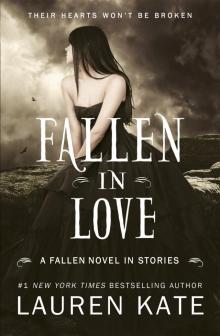 Fallen in Love
Fallen in Love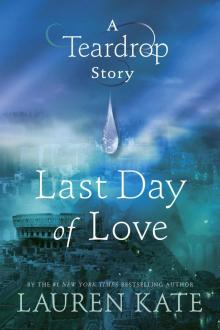 Last Day of Love: A Teardrop Story
Last Day of Love: A Teardrop Story Teardrop
Teardrop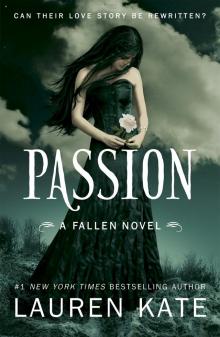 Passion
Passion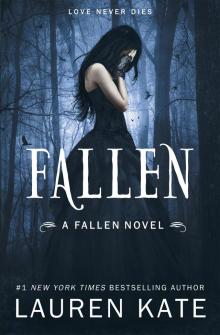 Fallen
Fallen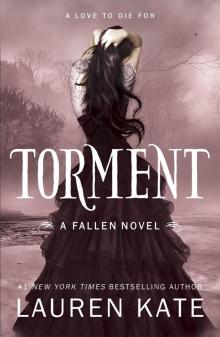 Torment
Torment Waterfall
Waterfall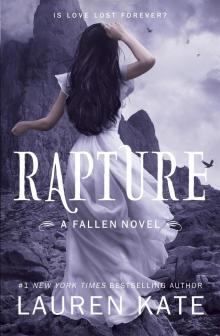 Rapture
Rapture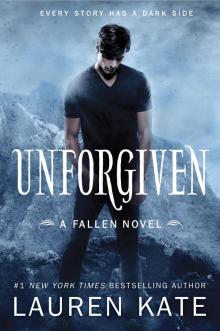 Unforgiven
Unforgiven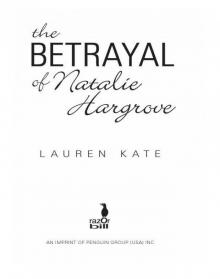 The Betrayal of Natalie Hargrove
The Betrayal of Natalie Hargrove The Orphan's Song
The Orphan's Song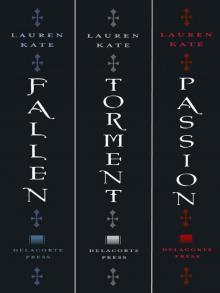 The Fallen Sequence: An Omnibus Edition
The Fallen Sequence: An Omnibus Edition Teardrop (Teardrop Trilogy 1)
Teardrop (Teardrop Trilogy 1)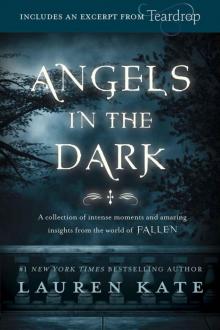 Fallen_Angels in the Dark
Fallen_Angels in the Dark